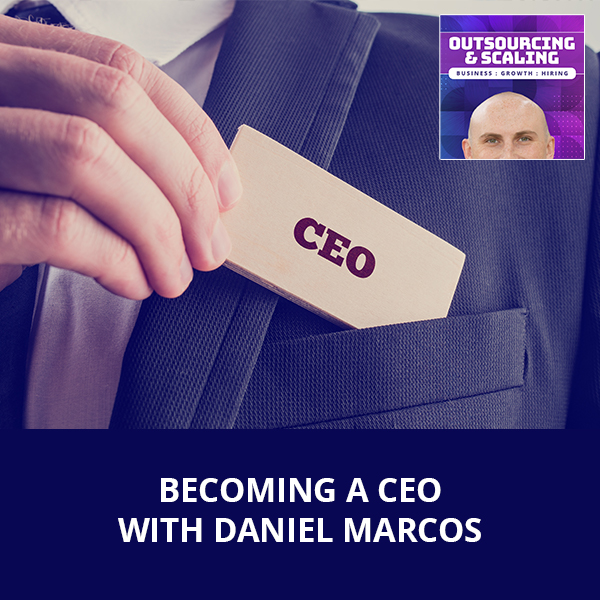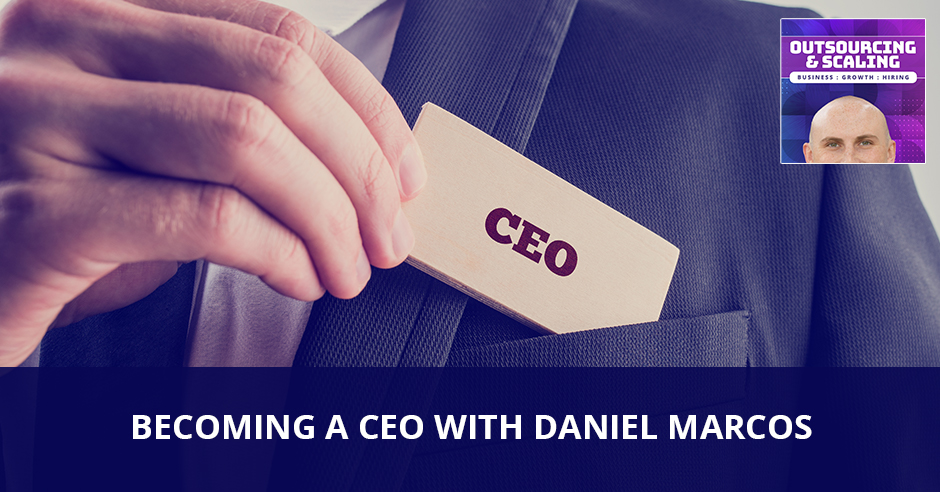


The path to becoming an impactful leader is through continuous learning. Daniel Marcos, the Cofounder and CEO of Growth Institute, walks us through his entrepreneurial journey to becoming a CEO, starting from when he was selling fishes to building the first financial website in the Mexican market. On today’s show, Daniel identifies the three critical stages to becoming a successful CEO and the importance of building a dedicated team with communication as a tool at the very helm of it.
—
Listen to the podcast here:
[smart_track_player url=”https://www.podetize.com/statsapi/www.podetize.com/wp-content/uploads/fileuploads/11-5b145ef137b51b3d1af0633e9305c43d/09/2019/76563efe9ae7a5426e756047f99a38bb.mp3″ title=”Becoming A CEO with Daniel Marcos” artist=”Nathan Hirsch” image=”https://freeup.net/wp-content/uploads/2019/04/OAS.png” ]
Download the audio file here.
Becoming A CEO with Daniel Marcos
My guest is Daniel Marcos. Daniel, how are you doing?
Thank you very much for the invitation.
We’re excited to have you. Daniel is the Cofounder and CEO of the Growth Institute. The leading online executive education company for C-level executives in fast–growing firms. He is a keynote speaker and a CEO coach with a mission to help one million entrepreneurs scale their companies faster and with less drama. If you know me, I’m all about less drama. I’m excited to talk to you. I always want to talk to people that can go more high level because I feel like we talk a lot about working with a VA for the first time or hiring for the first time. We are first one million. I’m excited to talk to you about bigger companies, CEOs scaling bigger businesses and we’ll do all of that. Let’s take a gigantic step back. I want to hear your story starting with what it was like growing up. Were you a straight-A student? Were you a rebel? Did you always know you wanted to be an entrepreneur?
I grew up in Mexico City. I was born in Monterrey on the north. My father worked for the government for 30 years, so we have to move to Mexico City. I was a bad student. I failed ninth grade, the first grade of high school. I had to redo it. I went to a school that you could get more classes than a grade. I did it again in two and a half years. I failed in the middle. I lived in Hong Kong for a couple of years and in London for a year. I went to college back in Mexico. The thing is I always had a business. When I was eight years old, I built my first business. At ten, I had an aquarium. I put a wall in the middle of my parent’s garage and put an aquarium on one side. The other side was their garage. I did all these kinds of things. I never dedicated myself to study because I was very young. I grew up in Mexico City and then moved to the US many years ago and now I live in Toronto, Canada.
What was your first entrepreneurial journey? Walk us through that.
[bctt tweet=”If you want to build a business, you have to build a team. ” username=””]
I have two cousins in Monterrey. They are very entrepreneurial. They opened this aquarium. They have these tanks where they were producing a lot of fish, these small fishes you have in your aquariums. Instead of buying and selling them on an aquarium, they figured out how to grow them. I built one of that and I was doing wholesale of fish when I was nine or ten years old. That was my first business. I loved it. It was a mess. We didn’t do anything right, but that’s where I spend all my afternoons. I went to school and came back. I never did homework and just did my aquarium. I also sold t-shirts and I did an auto detail van. A story in Mexico City, one day a week you cannot use your car because of pollution.
We did a van with water, electricity and all kinds of things. Whenever you go to work and your car stayed home, we got your house and cleaned it. That was my first real business. I went to college and everything. I worked in Hong Kong for a couple of years and then came back to do my first real business. This was 1999. I built the first financial website for the Mexican market. Whenever you could buy stock in games and quickly, I raised some money. I sold it to an Argentinian company that wasn’t similar to me. With a little bit with more money, we got together and we went to JP Morgan and did a $53 million raise when we were 25 and 26 years old.
We grew it to 1,200 contractors in nine countries and then sold it to Santander, the thirteenth biggest bank in the world, by the time when we were 28 or 29. It was an amazing growth. That’s where I learned about fast growth and drama in their companies. In my office in Mexico City, we went from six contractors to 85 in six months. I have no idea how to hire people or who to hire and all these kinds of issues that you usually have. I went from my marketing budget. My marketing budget for the first year was $100,000 and my second year was $8 million. You have no idea how to manage something like that. I had that experience running my first real business and that marked the way I am and how I see things in business.
Talk to me about drama. I opened up an office. I thought it would make less drama if I bring all these remote people, putting them together and it drove me crazy. I had people who were complaining because someone else smelled bad that sat next to them. This random nonsense that I didn’t want to deal with. How do you as a company that’s growing at that rate with that many people cut down on the drama and focus on what you should be focusing on?
If you want to go fast, you have to go alone. If you want to go far, you have to go with a team. If you want to build a big company, a company that is resellable, you have to build a team. That’s a start. Because we’re human beings, we create drama. We have ups and downs and we have personal lives that interact with our business life. We have a lot of issues because we are human beings and that’s normal. Verne Harnish, my partner, said that the dream of every entrepreneur is having no contractors and no customers and being able to rely on machines. That would be ideal. If you want to build a business, you have to build a team.

I found that there are two ways to help build a team. The first one is communication. You have to be extremely good with communication. You have a business that everyone works from home. You understand how communication has to be. You have to be very precise. You have to have communication, daily meetings and all of that. You have to, in a certain way, repeat yourself to a team until they start laughing at you. Once your team begins saying, “Here comes the boss again talking about core values,” that’s when they got core values. You have to repeat yourself and over-communicate yourself until they get it. The second one is the hiring process. The way I hire people before, if I interview someone and I like them, I hire them. I realize there’s a big science on how you get the right people.
The methodology that I use the most that helped me understand the process is top grading. The psychology is, hire as slow as you can and then fire as fast as you can. When you lose confidence in someone, fire them that day. If I don’t have confidence in a contractor, I will never ask them to do anything important. On the hiring part, you have to be extremely detailed in the process of hiring. If you hire well and then you give them good communication like direction and then there’s good communication with the team, you’re going to have problems. That’s normal because we’re human beings. Once you have a problem, they have a tool to fix that and whatever fixes problems or drama is communication.
Talk to me about executive assistant because we were chatting before that you had one for many years. I know a lot of CEOs feel like they should have an executive assistant. I have clients who they should have hired one year ago. What made you get one? How did that process go? Walk us through what she does for you every single week to make your life easier.
I saw a lecture one day with Jack Daly. Jack says, “If you don’t have an assistant, you are the assistant.” How many hours do you spend coordinating phone calls or restaurants or buying plane tickets? It’s crazy. If there are lots of things that you do then you have to understand that anyone or someone else could do it for you. Mine has been working for me for many years. She lives in Querétaro. She has been remote all her life. We’ve never worked in the same office. Interestingly, I live in Toronto now and when I met her, she was a single mom. She’s divorced. She got married again and the husband was sent to Toronto, so now she’s going to work in the same city as me, just by chance. She’s going to live in the other side of the city. It’s going to be an hour drive, but now she can be in Toronto.
I needed to have someone that manages my email most than anything. I have a big email problem. I probably get 300 or 400 emails every day. A lot of clients are asking for things, “Let’s set up a meeting, a call, a podcast or whatever.” I’ve got a Gmail and she has access to my Gmail. Probably five or six of my contractors respond to emails from my emails every day. I probably respond to 10% of my emails, all the other 90% are responded by someone else. Sometimes they tell you they’re them and sometimes they don’t even tell you. People say, “Thank you for the information.” “What do you mean?” “I emailed you and you sent me this.” “I don’t remember.” They do a lot of my email.
[bctt tweet=”Hire the lowest that you can and then fire the fastest that you can. ” username=””]
Let’s talk about that before we keep going. That’s where a lot of people get scared. I probably have twelve VAs that cover my email. They don’t pretend to be me. I have a rule that they can’t pretend to be me. They’re in there and just like you, about 10% of the emails, maybe a little less, get forwarded to me. They know which ones to escalate. How did you overcome that fear? How did you set up a system where emails aren’t getting missed, where you don’t lose that client experience, that they would get it if you were answering every single one?
You don’t start 100% to say, “Here it is.” There’s a graph that I saw that you have to give someone knowledge and then give them a little bit of control, more knowledge and then control. If you give a lot of control without knowledge, you make a disaster. A lot of knowledge with no control and the person is going to be desperate. You have to do little by little. He was at the beginning saying, “Go to my email and delete all the things that we don’t need.” As an example, before I didn’t allow her to delete and she had to send to a folder. I used to go to that folder, review and make sure whatever she was deleting was correct. Things like that, we’ve been doing a lot.
Little by little, I began giving her tasks and she’s performing them well. She made mistakes sometimes. Sometimes people email me and said, “Your assistant is responding and you’re not responding.” They get mad. For one person that gets mad, 10 or 50 others got served faster and better. If you want to be perfect or you want them to be you, it’s impossible. That’s never going to happen. Here’s one thing that is important, when I hired Myra, she was divorced. She had a daughter a couple of years and I came to her and said, “I need an assistant, but here’s the contract. I need you to at least work for me for ten years as my executive assistant.” She said, “Ten years?” I’m like, “You have a daughter two years. I will allow you to work wherever you want, go to all the fairs or whatever you have to go to her school. I will raise your salary every year, but I will not improve your job position every year. These ten years that you have to be close to your daughter and be flexible, I will allow you to have the flexibility and the income that you need to work from home.”
She said, “Okay.” That was it. Like a marriage, we’ve got several big fights. Because we are committed for ten years, we have to sit down and figure it out. We have to sit down and resolve it. If we didn’t have the agreement of ten years, I would have killed her and she would have probably killed me. We have to sit down and say, “This didn’t work. It was a mistake. How can we fix and solve it?” That’s been very powerful for us. We had a verbal commitment of at least ten years and we’re nine years into it. It’s been great. With time, I’ve been allowing other contractors in my office to get into my email and started doing things. We have learned together little by little how to work and do more things.
I’ve never heard of a ten-year contract with the VA, although it wasn’t really a contract, but you were setting the expectation upfront. Honestly, more people should do that because some people will hire a VA and the VA leaves after a year, six months or whatever it is. The business owner isn’t ready for it. At least you have that expectation there. It sounds like she did as well. How do you decide when to hire someone in the office or when to hire them remotely?
I do a lot of coaching. I travel a lot. I probably travel 250,000 miles a year. I do sessions all over the world. For me, having someone in the office doesn’t necessarily make sense. When I’m in the office, sometimes she will be in the office. I think we could do things easier and faster. It didn’t matter that much for me. I have two offices. I have an office in Austin, Texas and in Mexico City. Most of my contractors, probably 80%, 85% of them are in the office. They have to go to the office. That’s part of the agreement. If they say, “I feel bad. I need to go for a couple of weeks somewhere,” they could work remotely for a couple of weeks or whatever. Mostly they have to be in the office. In the case of Myra, that is my assistant, it doesn’t matter. I prefer that she is not in the office because she’s not distracted by any of the issues in the office. She’s focused on answering my emails, phones, whatever I ask her to do. Those are my personal things to do. She works right. Whenever I have an issue, I said, “Myra, I need you to go to the office.” She sometimes goes to the office for two or three days and clears things in the office.

You work with a lot of CEOs. Let’s say a CEO comes to you and they want to scale their business from $1 million to $5 million, from $5 million to $15 million or whatever it is. Where do you begin? What is the process that you put them through to help them be able to scale and grow?
First, they have to have a CEO system. Let me take a couple of steps back. I go to a company and say, “Show me your systems.” They say, “This is my accounting system, my customer support system and my manufacturing system.” I’m like, “Great, what’s your CEO system?” They say, “What do you mean?” I’m like, “How do you take decisions? What’s a system that you use yourself to be a great CEO?” People say, “I do it.” I’m like, “What do you mean you do it? You’re so intelligent that you have the best way to be a CEO and you have to hire systems and procedures for everything else in your business.” I push them to build a CEO system. The one I use is called Scaling Up by Verne Harnish.
Verne is my partner now, he was my mentor before. I hired him as my coach and significantly helped me understand what it is to be a CEO. This is something important. When I build my first online financial business website, we agreed to partner four friends from college. One day we said, “Let’s go to a café to agree to move forward.” We went to a café and spent probably five or six hours agreeing on what we were going to do on the business and all that. By the end of the five hours, we were ready to start. We have agreed how much money we were going to invest, what was the business model, all that. A friend said, “Let’s agree, who’s going to do what?” We were like, “That’s a great idea.” A guy said, “I worked at Lehman Brothers for two years. I know most about finance than all of you. I’ll be in charge of the financial product, but also I’ll be the CFO.”
The guy sitting in front of me said, “When I went to college, I studied electrical engineering and I know a lot more about technology than you, guys, so I’ll be the CTO.” The guy to my right said, “My father organized concerts. I know how to do some marketing and sales. I’ll be head of sales and marketing.” They looked at me and said, “What are you going to do?” I looked at each one and those were the three most important pillars of the company. They were already taken. I said, “I’ll be the CEO.” They said, “What do you mean?” I was like, “One has to be the CEO. One has to take decisions and be the director.” They looked at each other and said, “Okay.” That was it. No one prepares you to be a CEO.
Whenever you’re thinking about your business, you’re thinking of how to hire better assistants and, “How are we going to get clients? How we’re going to charge them?” You never think, “I’m going to be a CEO.” How do I become a great CEO? No one prepares you. One day, you cannot sleep at night because you’re worried about something and you realize you’re a CEO for the first time. Being a CEO, you have to take it like any other position. You have to train, learn by it and then build a system and a procedure to become a great CEO. For me, that’s it. I’ve been a reader for many years. I probably read a book a week.
[bctt tweet=”Control without knowledge means disaster. ” username=””]
I travel a lot. I’m on the road a lot. I have audiobooks and whenever I want to go back to a book, I buy it and then read it again in paper. I read the chapter that I want to read. I became a reader. That’s a very important one. Secondly, I began learning from other CEOs. I’m a member of EO and YPO. I learn from all the CEOs about what they do and how they run their company. I have a very detailed set of procedures to help you become a better CEO. I realized there are four stages in a scale up. It’s what I call start up, grow up, scale up, and then dominate your industry.
I figure out what are the important things that you have to focus on each stage to be able to become a better CEO. The way I see my company is it’s at the level that my mindset and my knowledge is. If my mindset and my knowledge is here, my company’s growth is going to be here. If my company begins growing faster, then I’m going to kill it myself. I’m going to destroy it. I have to grow myself faster than my company to be able to grow my company. All the time, understanding where the company needs to go and what is that I need to learn for me to be able to go higher and be able to take my company to the next level. As an example, on stage three, what I believe is a scale up. Stage one is start up. Stage two is grow up.
Imagine you’re a baby, kid, adolescent and adult. The adolescent is the scaling up phase. The one thing you have to do is infrastructure, systemize systems and procedures to make your company run as automatic as possible. Depending on the stage of the company, I help them understand what the real issue is and what they have to fix to be able to go to the next stage. Stage number one is understanding what you are selling. Prove your business model. It’s what are you selling, who are you going to sell it to, pricing channels, market dynamics and all that. Stage two is all about cashflow. Usually, stage two, the CEO, that’s when you get the oldest. You could see a CEO on stage one and stage three and they live considerably older on stage three.
Stage two, that’s when you have the most cash problems. Whenever you have all these cash problems, that creates a lot of stress. The second stage, the second thing you have to do is understand how to hire a great team. On first stage, you don’t hire a great team. The team chooses you. You don’t have good salaries, you don’t have a good brand and you don’t have a business model. Whoever works for you is because they chose you. On stage two, now you understand your business more. You have more cashflow. You have to be more selective of who you hire. If you’re on stage two, I will implement it immediately. If you’re on stage three, I’ll implement the function of a team. I’ll implement the scaling up.
You have to improve your selling process. As an example, going back to Jack Daly, everyone teaches you how to sell more. No one teaches you how to be a better sales manager. You have to learn how to be a sales manager on stage three. On stage one, you do most of the revenue of the company. You do all the selling with the people on the phone and all that. Stage three, now I want to have an army of people selling for me. I need to learn how to be a sales manager. That’s where I got Hyper Sales Growth by Jack Daly. Every stage there are certain things you have to implement to be able to take your company to the next level. It is not the same suit for every company. It depends on how many contractors you have in each stage, depending on what you need.
[bctt tweet=”The one thing that doesn’t allow CEOs to grow is ego. ” username=””]
Do you have any tips for going from an average CEO to an excellent CEO to bridge that last gap? Anything that you didn’t already talk about?
The one thing that doesn’t allow CEOs to grow is ego. If you think you’re the best to do things, you’re probably never going to grow. Here’s the issue, you have to hire people and allow them to make mistakes. Usually the strength of their founder or founders or the CEO becomes the weakness of the company. As an example, you’ll say, “I’m the best sales manager in my office.” If you’re the best sales manager in your office, you never hire a great sales manager. Your strength becomes your weakness. The one thing I work with the CEOs, it’s a mentality thing to allow to let go and trust the team. Sometimes they are going to make mistakes. That’s okay, but if you don’t allow them to make mistakes, they will never grow your company.
This has been fantastic. I learned a lot. I’m in the stage right now where we keep going into stage two, stage three. I took some notes. I think those are some great suggestions. Daniel, where can people find out more about you and what are you most excited about?
Growth Institute, that’s our platform. We have over 100 courses with 100 thought leaders. We’re focused on scaling companies faster with less drama. We put together a program called the MBD, the Master of Business Dynamics. We have 130 students going through it and we make you an expert on scaling companies. As an example, I went to my MBA in Babson, supposedly the best MBA for entrepreneurs around the world. I probably use 5% of what I learned to grow my company. It was amazing for critical thinking. It was a great program. It taught me critical thinking, but it didn’t give me any tools to scale my business. We teach companies or executives the tools they need to be able to scale their company and take it to the next level. I’m super excited about the MBD.
Daniel, thanks again. To our readers, check out Daniel if you’re looking to scale your business and become a better CEO.
Thank you, Nathan.
Important Links:
About Daniel Marcos
 Daniel Marcos is the co – founder and CEO of Growth Institute, the leading online executive education company for C- level executives at fast growing firms. He is a keynote speaker and a CEO Coach, with a mission to help 1 million entrepreneurs scale their companies faster and with less drama.
Daniel Marcos is the co – founder and CEO of Growth Institute, the leading online executive education company for C- level executives at fast growing firms. He is a keynote speaker and a CEO Coach, with a mission to help 1 million entrepreneurs scale their companies faster and with less drama.
He is an international speaker and has shared stage with thought leaders like Peter Diamandis, Guy Kawasaki and Jack Canfield, just to name a few. Daniel is the blogger of Capitalemprendedor.com. He is a graduate of EO’s premiere CEO program, the “Birthing of Giants”, and its continuation, “Gathering of The Titans”. He holds a BS in Industrial and Systems Engineering from ITESM (Monterrey Tech) and an MBA (cum laude) from Babson College at Wellesley, MA.

